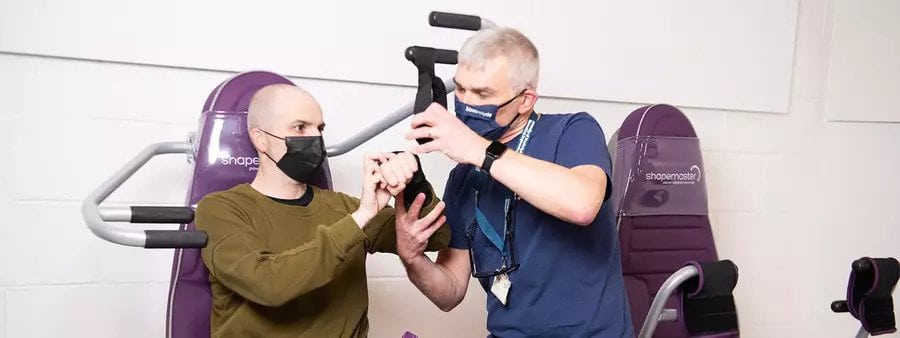University and charity partnership hopes to revolutionise future of stroke care through rehab tech

A pioneering new partnership between the University of Strathclyde and Chest Heart and Stroke Scotland (CHSS) is bidding to kickstart a revolution in stroke care by making rehabilitation technology accessible.
The aim is to improve stroke patients’ lives and to ease pressure off the NHS by facilitating patients’ recovery.
Academics at the university’s Department of Biomedical Engineering are working with the charity to integrate cutting-edge research in areas like robotics and computer gaming technology with CHSS’s Hospital to Home services. They aim to ensure a smooth transition for stroke patients discharged from hospital.
Over the next year, the partnership will integrate the work of Strathclyde engineers at the university’s Sir Jules Thorn Centre for Co-creation of Rehabilitation Technology and the Hospital to Home stroke services.
The centre uses artificial intelligence (AI) and machine-learned methods used in computer gaming to produce tailored exercise programmes for stroke survivors that encourage and support people in their own rehabilitation.
In the first phase, the work of the partnership is open to people in the west of Scotland, who will be given opportunities to take part in innovative recovery research and transform wraparound recovery support. The technology will then be developed using the insight generated from stroke survivors going through the centre, with the programmes generated made available in community settings across the country.
The first cohort of stroke survivors are already going through the programme, and it is hoped that through fundraising, the numbers will increase significantly over the next year.
Dr Andy Kerr, from Biomedical Engineering at the University of Strathclyde, said: “We are delighted to have Chest Heart & Stroke Scotland as a partner in our bid to revolutionise rehabilitation.
“Our determination is to develop technology that not only helps recovery but can also be used, easily, at home and in the local community, for example leisure centres. We consider this to be a key factor in improving access to rehabilitation technology.
“Our pilot has gone very well at the Sir Jules Thorn Centre for Co-creation of Rehabilitation technology, and we are well placed, with the support of CHSS, to scale up our efforts in the new year.”
Hospital care for stroke patients accounts for seven percent of all NHS beds and five percent of the entire Scottish NHS budget, according to the university. The work from the partnership aims to improve rehabilitation, which has been proven to aid recovery, improve people’s lives and reduce pressures on the NHS.
Jane-Claire Judson, Chief Executive of Chest Heart & Stroke Scotland, commented: “Rehabilitation is a lifeline that helps stroke survivors get their lives back. But cutting-edge rehabilitation technology and support is out of reach of most people in Scotland.
“This partnership will change that. It will kick start a revolution in stroke care in Scotland that will transform care for survivors and reduce pressures on our NHS.”
CHSS has set up a ‘Stroke Care Revolution Fund’ to help fund the venture. The charity is looking to initially raise £160,000 to support the work of the centre and help 450 stroke survivors access the services through the partnership over the next 12 months.

